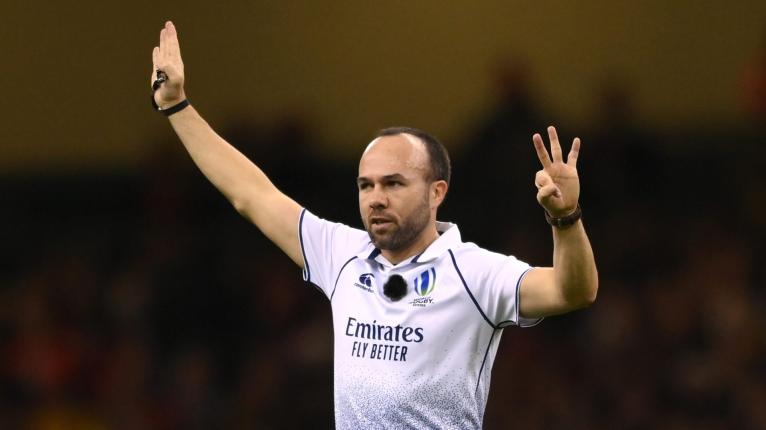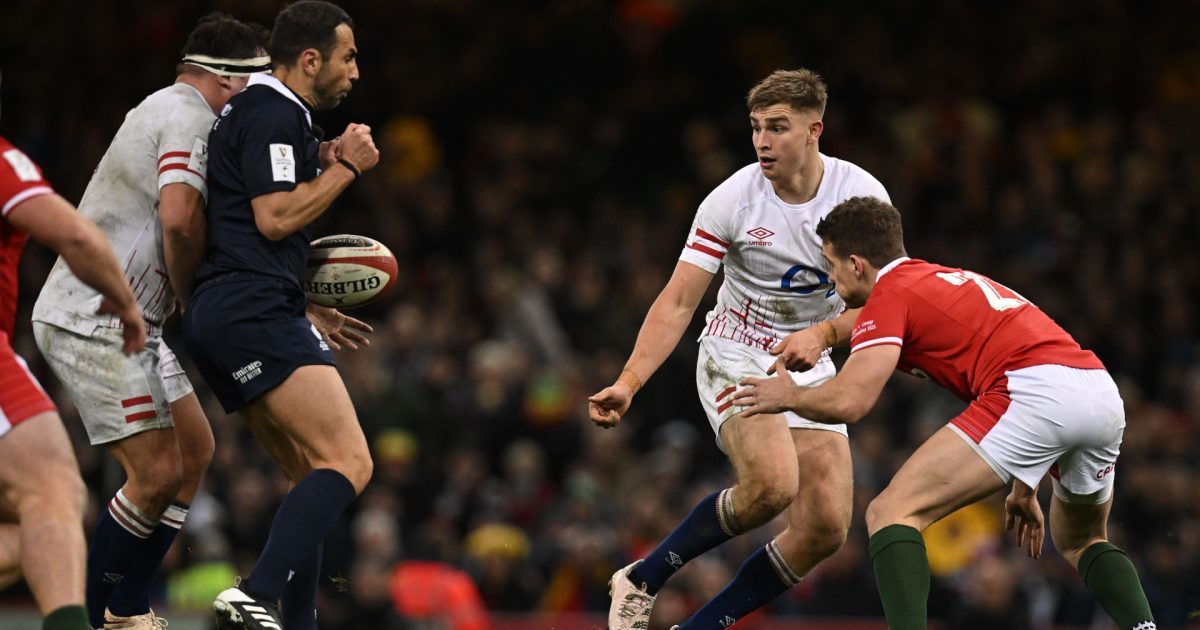Ref Watch: Any doubt around Mathieu Raynal is over

If any doubt did remain, French official Mathieu Raynal secured a place at his home World Cup later this year with an accomplished Six Nations display in Cardiff.
Raynal previously showed his ability to withstand a pressure cooker environment when picking up the baton during the 2021 Lions series in South Africa directly after Rassie Erasmus had savaged first test referee Nic Berry.
While this was – perhaps unusually for a Wales-England encounter – a low-key affair which saw two struggling sides offer little to provide France, Ireland or the Southern Hemisphere heavyweights with any sleepless nights, the weight of history, local rivalry and a packed Principality Stadium still test the mettle of even the most experienced match officials.
And Raynal rose to the occasion superbly to produce an extremely consistent display during which his accuracy at the breakdown and the scrum really stood out.
Management
It was very obvious from the lack of input from Owen Farrell or Ken Owens that both sides were comfortable with Raynal. The French official equally had no need to speak to either captain as both sets of players worked well within the framework he provided. A final penalty count of 9-6 in England’s favour reflected a job well done.
I especially liked his confidence to give Kyle Sinckler’s second-half try without consulting TMO Brian MacNeice, and the absence of any subsequent dispute from Wales confirmed that Raynal had this crucial call spot on.
 England Wales” width=”2560″ height=”1649″ />
England Wales” width=”2560″ height=”1649″ />
Consistent Mathieu
Raynal allowed a contest on the ground but managed to achieve this without the breakdown area becoming a mess. From the moment that Tauupe Faletau reached over the tackle area to scoop the ball from the England side, both sides knew where they stood and in the area which defined the match vultures Jack Willis and Lewis Ludlam picked Wales off on the ground a number of times as a result.
Scrum Detail
Despite what pundits like Andy Goode would have us believe, French officials tend to referee the scrum more accurately than most since the setpiece is such a big part of the Top 14.
Raynal clearly picked up that the contest between Tomas Francis and Ellis Genge was the point where the scrum may become destabilised and as a result positioned himself on the Wales tight head more regularly than would normally be the case.
As Nigel Owens mentioned in commentary, Raynal correctly penalised Francis for binding incorrectly then – after a brief conversation with the Wales no.3 prior to the next scrum – Genge was pinged for ‘hinging’ and causing a collapse.
Both decisions looked correct in replay and were the only penalties directly awarded during 16 scrums. Both sides also conceded a brace of free kicks, with Wales then suffering an upgrade to a penalty due to their identical offences being deemed ‘repeat technical infringements.’
Anorak Corner
The second half brought one real curiosity in law when Owen Williams collided with Anthony Watson in the air as the pair contested a high ball.
The Wales no.10 was injured enough that he took no further part in the match – albeit his substitution by Dan Biggar appeared planned anyway – and touch judge Chris Busby immediately flagged foul play.
However, he was instantly overruled by Raynal who not only adjudged Watson’s aerial challenge to have no reckless element to it, but also saw no need to even have a discussion with his assistant or ask MacNeice to check his view.

Italy v Ireland
Scotland’s Mike Adamson is part of the tightly-contested battle to claim a spot in the 12-strong refereeing team at France 2023 which will see three of this season’s Six Nations officials miss out.
As such he will be pleased that his last opportunity to impress in the Six Nations passed without major incident. However, I find it hard to escape the feeling that he slightly lacks the presence and composure of some of the more experienced officials currently around the international game and it won’t be a huge surprise if his involvement in the World Cup is as a touch judge.
TMO Use
A big tick in the box here, as Adamson worked superbly with experienced South African TMO Marius Jonker to ensure the officiating team produced the right decisions unobtrusively and without unnecessarily delaying the game.
It was especially apparent when Jonker called in a second half off-the-ball obstruction by Ireland’s Andrew Porter which saw play recalled for an Italy penalty and when Bundee Aki had a ‘try’ ruled out for his juggled knock-on.
Harsh Calls?
Adamson’s natural manner is less communicative than many, which works well for those who like their referees to be seen but not heard.
However, I felt he lacked a bit of empathy with the players at times which is perhaps surprising given that he is a relatively recent ex-professional.
For example, the decision to penalise Josh van der Flier when ball-carrier Andrew Porter collided with him immediately after the flanker had staggered back to his feet following the previous breakdown, could easily have been downgraded to accidental offside.
Similarly, the penalty awarded against Niccolo Cannone for his collision with Ireland’s Craig Casey seemed harsh. The Italian lock stood his ground defensively and wasn’t looking at the Irish no.9 at the point when Casey ran into him when pursuing a kick. Cannone’s shoulder undoubtedly hit his opponent firmly in the upper chest/throat area, but he has no obligation in law to move aside in this situation.
Scrum
With six of the first seven scrums failing to complete, the match was well into the second half before the front row contest settled down.
By this point three free kicks and three penalties had been evenly split while two scrums had also needed a reset.

Indeed, it was well past the hour mark and multiple replacements were on the field before Adamson got involved in sorting out the issues being caused by the gap between the front rows and their willingness to work with his engagement timing.
Simply repeating the phrase ‘stay high’ was not working – a big part of refereeing is identifying problems and proactively finding solutions to them – and this took much too long.
Give them an inch…
At international level players quickly spot every opportunity to gain a marginal advantage and Adamson’s approach to refereeing the breakdown gave Ireland’s defenders a chink which they were quick to exploit.
Of course, the players will have previously seen plenty of Adamson in provincial rugby and Ireland’s analysts will probably have picked up how the Scottish whistler’s positioning sometimes creates a ‘blind spot’ which allows the second, third and fourth defenders to steal a couple of steps beyond the offside line.
This is caused by Adamson getting very tight to the breakdown and sometimes beyond the attacking side’s hindmost foot. While this gives him a very good view of the contact area, the tackler’s release and the actions of the ball-carrier it also reduces his wider field of vision.
Although his touch judges will control the outside backs, those defenders positioned between the guards and the wide channels are some distance from them and as a result keeping them onside is the responsibility of the referee.


































































You must be kidding. He didn't bother to check grounding on a very contested try. Appalling.
this is very gratifying to read after the way Raynal has been treated over the past 6 months